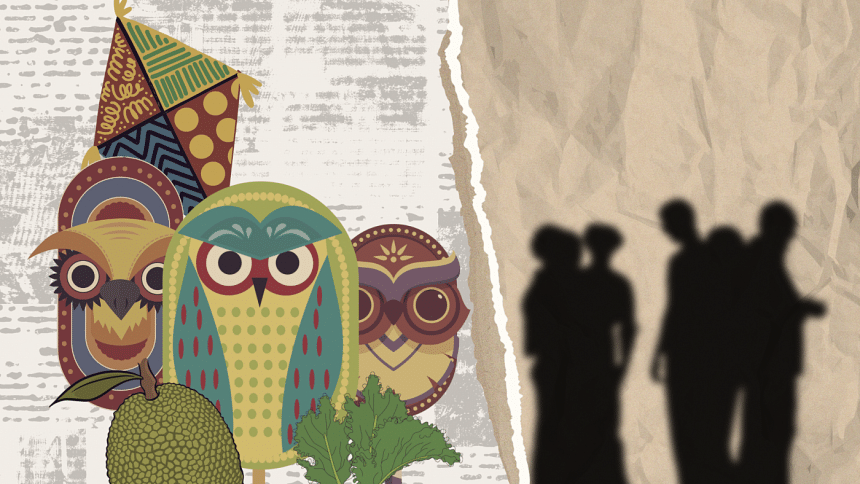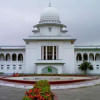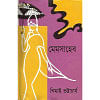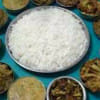Chaitra Sankranti: How do we detox our social body?

If you are here to read about Chaitra Sankranti, now is your time to turn back. But if you are here to read about having closure to the old Bangla year, that needed to have a ritualistic and symbolic detoxing through the consumption of a range of green and bitter foods, then you can stay on.
Cultural insiders indulge in repeated practices to assert their allegiance to a community and endorse a worldview. As one Bangla year comes to an end, most of us will celebrate the incoming year as an occasion to welcome the new and commit to the existing structure of things to reinforce the tradition that is linked to our essential identity, rooted in the soil and the soul that we define as Bangalee. For some, the day holds religious significance as the green, bitter, and leafy items are consumed with symbolic purpose.
One of our colleagues shared a dish of green jackfruits with us on Eid. She said that they would have it on Chaitra Sankranti as part of many other bitter dishes. Did the outgoing year leave a bitter taste in your mouth? Do we need to spring into the new year with a lot of rejuvenated greenery? Isn't green a symbol of youth and vitality? Why, then, are we dealing with a generation that has been incorrigibly bitter? How do we detox our social body? Just a day-long observance of a ritual will not bring any social change. For change to occur, the passion and belief systems to which our youth have been conditioned need to be reassessed.
You may wonder why I am choosing a particular age group when considering change. The long and short of it is that we are passing through a once-in-a national lifetime demographic dividend. But we are failing to reap its benefits as we have not managed to provide the right education or orientation to our young generation.
Now, you may say it is a rather pessimistic thought to have when the nation is in such a festive mood, enjoying the double bill of Eid and the Bangla New Year. I am trying to process the news of the death of a dentist father who got attacked by a gang of youth in Chattogram while trying to protect his son from their beatings. The son went out to buy iftar for his family when he came across the gang mercilessly manhandling two schoolboys. Responding to the pleas of the victims, he called the emergency hotline of the police. Irked by his action, the gang turned on him and started beating him. His father came to his rescue, but a brick block struck him instead. He succumbed to his injuries on the eve of Eid.
The dentist father Korban Ali's courageous act to shield his son from harm exemplifies the lengths to which parents go to safeguard their children, but it also underscores the pervasive threat posed by these gangs and the devastating consequences they can inflict upon families. His son Ali Reza's harrowing ordeal sheds light on the ruthlessness of teen gangs and the fear they instil in communities. His cry for justice resonates with countless families across the nation who have fallen victim to similar acts of senseless violence. The loss of Korban Ali is more than just a personal tragedy; it is a collective loss for our society, one which reflects the failure of our system to protect its citizens from such preventable tragedies.
What is particularly alarming is the reported affiliation of these gangs with influential political figures, as highlighted by Ali Reza's accusation that the gang members were supporters of a local Awami Jubo League leader. Such connections only embolden these groups, granting them impunity to terrorise neighbourhoods and prey upon innocent individuals. Intertwining gang culture with political patronisation cultivates a toxic environment that fosters lawlessness and obscures accountability.
The psycho-social aspects of gang culture play a significant role in perpetuating this cycle of violence. For many young people, especially those from marginalised communities, joining a gang offers a sense of belonging and identity in environments where opportunities for positive social mobility are limited. The allure of power, respect, and protection within the gang hierarchy can be seductive, drawing vulnerable individuals into a life of crime and violence. The abuse of narcotic substances adds to the menace.
These instances reaffirm the status of politics as corrupt and self-serving, contributing to a sense of apathy and disillusionment. When citizens perceive political leaders as figures who are indifferent to the plight of ordinary people and as the root cause of criminal activities, it is not abnormal for the public to disengage from the political process altogether. Ironically, one's conscious stance against politics can be political in itself. For instance, students who resist campus politics at Buet, whether they like it or not, have already become part of the political system. Activities aimed at improving someone's status or increasing power within an organisation are common features of campus politics. The way the protesting students have located their personal experiences of keeping violence off their academic course has made them navigate a system of power relationships. They are staying away from exams to stop the student wings of political parties from formally operating on campus. Their bitter memories made them exhibit the different shades of green that we, the grey-haired generations, often fail to realise.
The vice-chancellor of Buet has said that politics allows students to open their eyes. But on the other side of the globe, the sun has come out of the moon's shadow. Their eyes are already open. These students have promised their VC: give us a politics-free campus, and we will give you a ranked university.
It is time for us to decide which type of students we should invest in. Who are the ones who will give us dividends? Chaitra Sankranti is also a day to repay all debts. A father's murder is a national debt that we must repay by investing in our next generation. When we remove the curtain of darkness, the sun also rises. It's time to cleanse the social body of the ills afflicting it. Gang culture, partisan politics, and hapless youth cannot be part of the algorithm needed for a Smart Bangladesh.
Dr Shamsad Mortuza is professor of English at Dhaka University.
Views expressed in this article are the author's own.
Follow The Daily Star Opinion on Facebook for the latest opinions, commentaries and analyses by experts and professionals. To contribute your article or letter to The Daily Star Opinion, see our guidelines for submission.

 For all latest news, follow The Daily Star's Google News channel.
For all latest news, follow The Daily Star's Google News channel. 










Comments